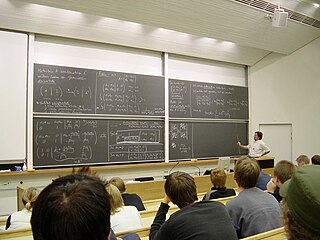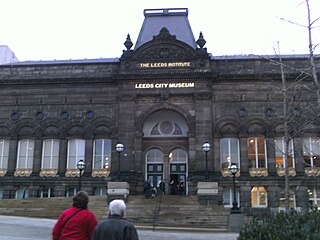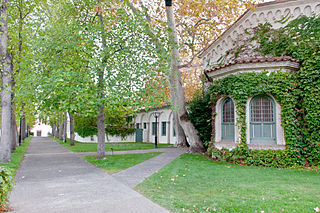
A college is an educational institution or a constituent part of one. A college may be a degree-awarding tertiary educational institution, a part of a collegiate or federal university, an institution offering vocational education, a further education institution, or a secondary school.

A community college is a type of undergraduate higher education institution, generally leading to an associate degree, certificate, or diploma. The term can have different meanings in different countries: many community colleges have an open enrollment policy for students who have graduated from high school, also known as senior secondary school or upper secondary school. The term usually refers to a higher educational institution that provides workforce education and college transfer academic programs. Some institutions maintain athletic teams and dormitories similar to their university counterparts.
Distance education, also known as distance learning, is the education of students who may not always be physically present at school, or where the learner and the teacher are separated in both time and distance. Traditionally, this usually involved correspondence courses wherein the student corresponded with the school via mail. Distance education is a technology-mediated modality and has evolved with the evolution of technologies such as video conferencing, TV, and the Internet. Today, it usually involves online education and the learning is usually mediated by some form of technology. A distance learning program can either be completely a remote learning, or a combination of both online learning and traditional offline classroom instruction. Other modalities include distance learning with complementary virtual environment or teaching in virtual environment (e-learning).

Oxbridge is a portmanteau of the Universities of Oxford and Cambridge, the two oldest, wealthiest, and most famous universities in the United Kingdom. The term is used to refer to them collectively, in contrast to other British universities, and more broadly to describe characteristics reminiscent of them, often with implications of superior social or intellectual status or elitism.

Tertiary education, also referred to as third-level, third-stage or post-secondary education, is the educational level following the completion of secondary education. The World Bank, for example, defines tertiary education as including universities as well as trade schools and colleges. Higher education is taken to include undergraduate and postgraduate education, while vocational education beyond secondary education is known as further education in the United Kingdom, or included under the category of continuing education in the United States.
King's College or The King's College often refers to two higher education institutions in the United Kingdom:

Mixed-sex education, also known as mixed-gender education, co-education, or coeducation, is a system of education where males and females are educated together. Whereas single-sex education was more common up to the 19th century, mixed-sex education has since become standard in many cultures, particularly in western countries. Single-sex education remains prevalent in many Muslim countries. The relative merits of both systems have been the subject of debate.

Mechanics' institutes, also known as mechanics' institutions, sometimes simply known as institutes, and also called schools of arts, were educational establishments originally formed to provide adult education, particularly in technical subjects, to working men in Victorian-era Britain and its colonies. They were often funded by local industrialists on the grounds that they would ultimately benefit from having more knowledgeable and skilled employees. The mechanics' institutes often included libraries for the adult working class, and were said to provide them with an alternative pastime to gambling and drinking in pubs.
The Doctor of Education is a research or professional doctoral degree that focuses on the field of education. It prepares the holder for academic, research, administrative, clinical, or professional positions in educational, civil, private organizations, or public institutions. Considerable differences exist in structure, content and aims between regions.

The UCL Institute of Education (IOE) is the faculty of education and society of University College London (UCL). It specialises in postgraduate study and research in the field of education and is one of UCL's 11 constituent faculties. Prior to merging with UCL in 2014, it was a constituent college of the University of London. The IOE is ranked first in the world for education in the QS World University Rankings, and has been so every year since 2014.

Women's colleges in higher education are undergraduate, bachelor's degree-granting institutions, often liberal arts colleges, whose student populations are composed exclusively or almost exclusively of women. Some women's colleges admit male students to their graduate schools or in smaller numbers to undergraduate programs, but all serve a primarily female student body.

The Southern Association of Colleges and Schools (SACS) is an American educational accreditor recognized by the United States Department of Education and the Council for Higher Education Accreditation. This agency accredits over 13,000 public and private educational institutions ranging from preschool to college level in the Southern United States. Its headquarters are in North Druid Hills, Georgia, near Decatur, in the Atlanta metropolitan area.

An art school is an educational institution with a primary focus on practice and related theory in the visual arts and design. This includes fine art – especially illustration, painting, contemporary art, sculpture, and graphic design, with some schools including disciplines such as video game design, photography, fashion design, textile design, conceptual art, web design, architectural design and engineering, journalism and social media; some continuing craft traditions such as pottery, embroidery, printmaking, metalwork, or building crafts; and many covering theoretical subjects such as cultural anthropology, cultural theory and cultural history including histories of art traditions in local and global cultures, design theory, business and industry studies such as marketing communication, customer profiling and production related technical subjects. Art schools can offer elementary, secondary, post-secondary, undergraduate or graduate programs, and can also offer a broad-based range of programs. In the West there have been six major periods of art school curricula, and each one has had its own hand in developing modern institutions worldwide throughout all levels of education. Art schools also teach a variety of non-academic skills to many students.

The Ministry of Education of the People's Republic of China is a constituent department of the State Council, responsible for basic education, vocational education, higher education, and other educational affairs throughout the country. The Ministry of Education acts as the predominant funder of national universities and colleges in China. The ministry also accredits tertiary institutions, degree curriculum, and school teachers of the country.
Education policy consists of the principles and policy decisions that influence the field of education, as well as the collection of laws and rules that govern the operation of education systems. Education governance may be shared between the local, state, and federal government at varying levels. Some analysts see education policy in terms of social engineering.

Private universities and private colleges are institutions of higher education that are not operated, owned, or institutionally funded by governments. However, they often receive tax breaks, public student loans, and grants from governments. Depending on their location, private universities may be subject to government regulation. Private universities may be contrasted with public universities and national universities. Many private universities are nonprofit organizations.
An educational institution is a place where people of different ages gain an education, including preschools, childcare, primary-elementary schools, secondary-high schools, and universities. They provide a large variety of learning environments and learning spaces.

The British and Foreign School Society (BFSS) offers charitable aid to educational projects in the UK and around the world by funding schools, other charities and educational bodies. It was significant in the history of education in England, supporting free British Schools and teacher training in the 19th century; it continued in the latter role until the 1970s. In the 19th century it fiercely competed with the National Society for Promoting Religious Education, which had the support of the established Church of England, the local parishes, and Oxford and Cambridge universities. Both institutions promoted the monitorial system, whereby few paid teachers supervised the senior students who in turn taught the younger students.

The Ministry of Education (MoE) is a ministry of the Government of India, responsible for the implementation of the National Policy on Education. The ministry is further divided into two departments: the Department of School Education and Literacy, which deals with primary, secondary and higher secondary education, adult education and literacy, and the Department of Higher Education, which deals with university level education, technical education, scholarships, etc.

The Ministry of Education of Iran established in 1964, is an Iranian government body (department) responsible for the oversight of K-12 education in Iran. Each year, a certain portion of the yearly budget gets allocated to public educational institutions. Currently, the average of 20% of government spending and 5% of GDP is allocated to the education sector, a rate that is subjectively higher than most other countries that are in the similar age bracket of Iran. The amount that is allocated to the educational institutions, 50% of it is given to secondary education institutions and 21% of the annual state education budget is allocated to the post-secondary educational institutions . Also Shahid Rajaee Teacher Training University and Farhangian University are the university of teacher education and human resource development in the Ministry of Education.














